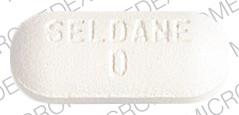Pseudoephedrine / Terfenadine Dosage
Applies to the following strengths: 120 mg-60 mg
Usual Adult Dose for:
Additional dosage information:
Usual Adult Dose for Allergic Rhinitis
Dosage: 1 tablet (120 mg-60 mg) by mouth 2 times a day.
Usual Adult Dose for Nasal Congestion
Dosage: 1 tablet (120 mg-60 mg) by mouth 2 times a day.
Liver Dose Adjustments
1 tablet (120 mg-60 mg) once a day.
Caution: Liver disease will increase the risk of cardiotoxicity with terfenadine.
Dose Adjustments
Pseudoephedrine is eliminated by the kidney and may accumulate in patients with renal dysfunction. Patients with renal dysfunction should be monitored for signs and symptoms of toxicity when using pseudoephedrine.
Dialysis
Pseudoephedrine is partially removed by hemodialysis, therefore doses should be given following dialysis sessions.
Other Comments
pseudoephedrine-terfenadine was withdrawn from the market in 1998.
More about pseudoephedrine / terfenadine
- Check interactions
- Compare alternatives
- Side effects
- During pregnancy
- Drug class: upper respiratory combinations
Related treatment guides
See also:
Further information
Always consult your healthcare provider to ensure the information displayed on this page applies to your personal circumstances.


